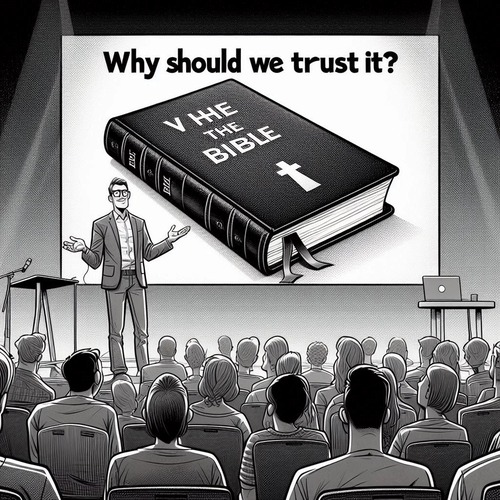The Greatest Yet the Least: How Is John the Baptist Both?
In Matthew 11:11, Jesus makes a statement that has puzzled Bible readers: “Truly I tell you, among those born of women there has not risen anyone greater than John the Baptist; yet whoever is least in the kingdom of heaven is greater than he.”
How can John simultaneously be the greatest person ever born and yet somehow lesser than even the “least” in God’s kingdom? The apparent paradox presents profound truths about redemptive history and our position in Christ that are worth an explore…
JOHN’S UNPARALLELED GREATNESS
What made John the Baptist so extraordinary? In the Reformed tradition, John is the culmination of the Old Testament prophetic line—the final and greatest prophet before Christ’s arrival.
John was no ordinary prophet. God set him apart from birth for a unique mission (Luke 1:13-17). As the fulfillment of Isaiah’s prophecy of “a voice crying in the wilderness” (Isaiah 40:3), John had the singular privilege of directly preparing the way for the Messiah. While other prophets spoke of a distant hope, John pointed and declared, “Behold, the Lamb of God!” (John 1:29).
His exceptional character also distinguished him. Living in the wilderness, clothed in camel’s hair, eating locusts and wild honey (Matthew 3:4), John embodied complete devotion to his calling. Even Jesus marvelled at his unwavering commitment, asking the crowds, “What did you go out to see? A reed swayed by the wind?” (Matthew 11:7).
In the Reformed understanding, John’s greatness lies in his pivotal historical position. He stood at the climax of the old covenant era, as the final messenger preparing Israel for her long-awaited Messiah. As Jesus himself stated, John was “more than a prophet” (Matthew 11:9)—he was the fulfillment of Malachi 3:1: “I will send my messenger ahead of you, who will prepare your way before you.”
THE DISPENSATIONAL SHIFT
To understand the paradox, we must recognise John stood at a crucial transition point between two covenant eras. Reformed theology emphasises God’s progressive revelation through distinct covenant periods, each building upon the previous.
John ministered under the old covenant, before Christ’s death and resurrection established the new covenant. He proclaimed the kingdom as “at hand” but did not live to experience its full inauguration. As Jesus said, “The Law and the Prophets were until John; since then the good news of the kingdom of God is preached” (Luke 16:16).
John was like Moses viewing the Promised Land from Mount Nebo—he could see it, proclaim its coming, but not enter into its fullness. His ministry belonged to the preparation, not the fulfillment.
THE PRIVILEGED POSITION OF KINGDOM CITIZENS
Here’s where Reformed theology offers profound insight: when Jesus speaks of “the least in the kingdom,” He’s referring to the privileged position all believers occupy after His completed work of redemption.
Even the “least” New Testament believer stands in a position that John, for all his greatness, could not yet occupy. We who believe after Christ’s death and resurrection enjoy blessings that prophets and kings longed to see (Luke 10:24).
What makes our position greater? Here are several key advantages:
- Full revelation of Christ’s work: We understand what John could only anticipate—the cross, resurrection, and ascension. We see God’s redemptive plan fulfilled rather than merely promised.
- The indwelling Holy Spirit: While the Spirit came upon John from birth (Luke 1:15), believers under the new covenant experience the permanent indwelling of the Spirit (Romans 8:9-11), a blessing distinctive to the post-Pentecost era.
- Participation in the inaugurated kingdom: John announced the kingdom’s approach; we participate in its reality, though awaiting its consummation.
- Our position “in Christ”: Reformed theology emphasises our union with Christ—we are counted righteous in Him, adopted as sons and daughters, and given direct access to the Father.
This isn’t about personal merit but covenant position. John himself recognised his transitional role, stating, “He must increase, but I must decrease” (John 3:30). The “least” believer participates in the fulfillment that John could only herald.
CONCLUSION: THE GREATEST YET THE LEAST
The apparent paradox in Jesus’ statement about John reveals the progressive nature of God’s redemptive work. John’s greatness among those “born of women” highlights his extraordinary character and historical significance. Yet the “greater” status of kingdom citizens speaks to our privileged position in Christ, enjoying the fulfillment of what John could only anticipate.
This understanding, rooted in Reformed covenant theology, doesn’t diminish John’s remarkable legacy. Rather, it magnifies the wonder of what Christ has accomplished and the extraordinary blessing of being counted among God’s new covenant people.
In Christ, even “the least” stands in a position that the greatest old covenant prophet could only glimpse from afar—a truth that should inspire both humility and profound worship.
THE GREATEST YET THE LEAST: RELATED FAQs
Did John the Baptist fully understand his role in redemptive history? John demonstrated remarkable self-awareness about his transitional role, famously stating, “He must increase, but I must decrease” (John 3:30). However, even John experienced moments of doubt, as evidenced when he sent disciples from prison to ask Jesus, “Are you the one who is to come?” (Matthew 11:3). This suggests that while John understood his preparatory role, he might not have fully grasped the nature of Christ’s kingdom.
- How do contemporary Reformed scholars explain this passage? Michael Horton emphasises this passage highlights the inauguration of a new eschatological age with Christ’s coming. In his systematic theology, Horton argues that John represents the culmination of the old prophetic era, while even new believers participate in the inaugurated kingdom reality that transforms their ontological status before God. This reflects the “already/not yet” tension in Reformed eschatology.
- Was John the Baptist part of the Old or New Covenant? Most Reformed theologians place John firmly within the Old Covenant administration, as he died before Christ’s sacrificial work was completed. DA Carson notes that John stood at the cusp of the covenantal transition but ultimately belonged to the preparatory era. John’s baptism, while pointing forward to Christ, was distinct from Christian baptism instituted after Christ’s resurrection (Acts 19:1-7).
Does “least in the kingdom” refer to believers on earth or in heaven? RC Sproul and other Reformed scholars generally interpret “kingdom of heaven” here as referring to the present reality of Christ’s kingdom inaugurated at His first coming, not exclusively the future heavenly state. The comparison involves the position and privileges of believers who live on this side of the cross, regardless of their spiritual maturity or heavenly status. This interpretation aligns with the Reformed emphasis on the “already” aspect of the kingdom.
- How does this passage relate to the Reformed doctrine of progressive revelation? Sinclair Ferguson explains this passage perfectly illustrates progressive revelation, showing how God’s self-disclosure unfolds through redemptive history. The Reformed tradition emphasises that while Old Testament saints were saved by faith in God’s promises, New Testament believers experience a fuller revelation of those promises fulfilled in Christ. This isn’t about intelligence or spiritual maturity but about historical position in God’s unfolding plan.
- Did Jesus’ statement diminish John’s personal salvation or standing before God? Kevin DeYoung emphasises that Jesus’ statement addresses John’s historical role rather than his personal salvation or eternal reward. John’s own faith in the coming Messiah placed him among those who would inherit the kingdom. The comparison concerns John’s objective position in redemptive history, not his subjective experience of salvation.
How should this passage shape our view of Old Testament figures? According to Richard Gaffin and others, this passage teaches us to read Scripture with a redemptive-historical hermeneutic that recognises the progressive nature of God’s revelation. While we deeply honour Old Testament saints for their faith, we also recognise the superior position we occupy with fuller revelation and the Spirit’s indwelling. This should produce both gratitude and humility as we recognise our privileged historical position is entirely by God’s grace.
THE GREATEST YET THE LEAST: OUR RELATED POSTS
Editor's Pick

Will We Remember This Life in Heaven? What Isaiah 65:17 Means
"Will I remember my spouse in heaven? My children? Will the joy we shared on earth matter in eternity?" These [...]

From Empty to Overflow: The Abundant Life Jesus Promised
(AND WHY YOU SHOULDN’T SETTLE FOR LESS) We're surviving, but are we thriving? If we're honest, there's a gap between [...]

What Does Jesus Save Us From?
THREE BIBLE TRUTHS ABOUT SALVATION "Jesus saves." We’ve seen it on bumper stickers, heard it shouted at sporting events, maybe [...]

If God Wants Everyone Saved, Why Aren’t They?
THE REFORMED VIEW ON GOD’S DESIRE VS HIS DECREE The question haunts every believer who has lost an unbelieving loved [...]

The One Man Mystery in Acts 17:26: Is It Adam Or Noah?
When the Apostle Paul stood before the philosophers at Mars Hill, he delivered an insightful statement about human unity: “And [...]

Megiddo Or Jerusalem: Where Did King Josiah Die?
Recent archaeological discoveries at Tel Megiddo continue to reveal evidence of Egyptian military presence during the late 7th century BC, [...]

Losing Your Life Vs Wasting It: How Are the Two Different?
AND WHY DID JESUS PRAISE THE FORMER? Jesus spoke one of the most perplexing statements in Scripture: “For whoever wants [...]

Can Christians Be Demon Possessed? What the Bible Teaches
Perhaps you’ve witnessed disturbing behavior in a professing Christian, or you’ve struggled with persistent sin and wondered if something darker [...]

Sacred Fury: What Christ’s Temple Cleansing Truly Means
Mark 11 records the crack of a handmade whip that echoed through the temple corridors. Tables crashed to the ground, [...]

Did Jesus Cleanse the Temple Twice?
OR DID JOHN DISAGREE WITH THE SYNOPTICS ON TIMING? One of sceptics’ favourite "gotcha" questions targets what they see as [...]
SUPPORT US:
Feel the Holy Spirit's gentle nudge to partner with us?
Donate Online:
Account Name: TRUTHS TO DIE FOR FOUNDATION
Account Number: 10243565459
Bank IFSC: IDFB0043391
Bank Name: IDFC FIRST BANK






